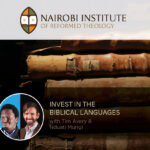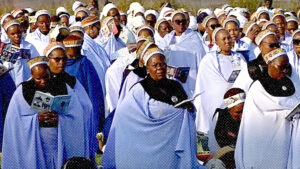Excellent Reformed and Evangelical conferences are held across Africa every year. The TGC Africa Podcast showcases select conferences to encourage and build up the local church across our continent.
This talk is the second of two delivered at the 2024 REACH SA Gauteng Men’s Convention hosted at Christ Church Blairgowrie, Johannesburg, South Africa.
Sometimes prayer can feel hard. Really difficult. Impossible even. Life can be overwhelming or unrelenting, often both. Despair can easily set in. But it’s much harder to dislodge. Conversations about those sorts of struggles are typically categorised as matters of mental health; unfortunately, men are much slower to have those conversations than women. Where should men turn when they can’t see a way out, or forward? Though it isn’t the whole answer, perhaps the best place to start is prayer.
For the Christian, prayer is one the of the most beautiful expressions of our relationship with God. Often, simply setting apart time to pray serves as a reminder that we have a relationship with God—a heavenly Father who loves and cares for us. But prayer doesn’t always come easily. Sometimes it’s hard fought; sometimes we feel like giving up or find the weigh of the broken world unbearable; at other times we just don’t know what to pray.
Come Weary and Honest, Come to the Lord
In this sermon, Kyle Johnston walks us through Psalm 102. The psalm is an honest lament of a believer on the verge of giving up. The psalmist feels utterly defeated. Despondent. But as the psalmist writes he moves from despair to hope; from sadness to joy. Psalm 102 pivots, gloriously, as the psalmist beholds God enthroned in Zion.
Much like the psalmist, we can behold our enthroned God. Only Zion has taken on an even greater wonder, with the work of Christ. Our hope is much clearer, richer even. We have a hope that cannot be shaken (Acts 2:25-26). This hope enables us to persevere and to pray when we feel like giving up. As Kyle says, “If you’re in a season where you are just feeling very weary, distressed, and low, instead of trying to say, “I shouldn’t feel that way,” rather, take that to the Lord.”
Other Content On the Topic of Prayer:
Struggle in His Strength
Psalm 91: Eternal Safety in a World of Danger
Feeling Weak? Don’t Worry, God Uses Broken Vessels
10 Mistakes I Made When Learning How to Pray
Date: Saturday, 19 October 2024
Location: REACH SA Gauteng Men’s Convention, Christ Church Blairgowrie, Johannesburg, South Africa
Transcript
How Can I Pray When I Feel Like Giving Up?
Thanks, Lee. Well, it’s nice to be back together. Hope the coffee was good. If you have a Bible, would you please turn to Psalm 102?
What we’re trying to do today is—we’re trying to take these mental health challenges and we’re trying to bring them under the oversight of Scripture, right? We’re taking this language we often hear, language that can often describe real struggles, and we’re trying to bring it to Scripture and make these connections between life and Scripture.
What I want to look at now is how Scripture can help us to pray when we feel like giving up. So, that’s the title of this talk: How Can I Pray When I Feel Like Giving Up? I think we’ve got some slides for it as well.
Life with God—as we talked about earlier—life with God means reciprocal fellowship: that God speaks to me through His Word, and I respond to God in prayer. God speaks to me through His Word, I respond to God in prayer—on and on, back and forth.
And one of the great things about prayer is that it not only helps us identify what’s going on in our hearts, it helps us realize we’re in a relationship with our Heavenly Father who loves us and who cares for us.
But sometimes, you don’t feel like praying. In fact, sometimes you don’t even feel like you’ve got the strength to pray. I don’t know if any of you have ever been in that situation. Sometimes we just grow weak, and we can’t pray anymore.
What do we do then?
Psalm 102 will help us—because Psalm 102, if you look at the superscription there, is the prayer of an afflicted person who has grown weak and pours out a lament before the Lord.
I’m not sure if that’s ever described you. I don’t want to be the bearer of bad news, but if it hasn’t described an experience you’ve already had, it will probably describe a future experience you will have.
So let’s look at the psalm. I’ll read it, and let’s look at the psalm together and think about how this psalm can teach us how to pray when we feel like giving up. I’ll read it for us.
“Hear my prayer, Lord;
let my cry for help come to you.
Do not hide your face from me
when I am in distress.
Turn your ear to me;
when I call, answer me quickly.
For my days vanish like smoke;
my bones burn like glowing embers.
My heart is blighted and withered like grass;
I forget to eat my food.
In my distress I groan aloud
and am reduced to skin and bones.
I am like a desert owl,
like an owl among the ruins.
I lie awake; I have become
like a bird alone on a roof.
All day long my enemies taunt me;
those who rail against me use my name as a curse.
For I eat ashes as my food
and mingle my drink with tears
because of your great wrath,
for you have taken me up and thrown me aside.
My days are like the evening shadow;
I wither away like grass.
But you, Lord, sit enthroned forever;
your renown endures through all generations.
You will arise and have compassion on Zion,
for it is time to show favor to her;
the appointed time has come.
For her stones are dear to your servants;
her very dust moves them to pity.
The nations will fear the name of the Lord,
all the kings of the earth will revere your glory.
For the Lord will rebuild Zion
and appear in his glory.
He will respond to the prayer of the destitute;
he will not despise their plea.
Let this be written for a future generation,
that a people not yet created may praise the Lord:
“The Lord looked down from his sanctuary on high,
from heaven he viewed the earth,
to hear the groans of the prisoners
and release those condemned to death.”
So the name of the Lord will be declared in Zion
and his praise in Jerusalem
when the peoples and the kingdoms
assemble to worship the Lord.
In the course of my life he broke my strength;
he cut short my days.
So I said:
“Do not take me away, my God, in the midst of my days;
your years go on through all generations.
In the beginning you laid the foundations of the earth,
and the heavens are the work of your hands.
They will perish, but you remain;
they will all wear out like a garment.
Like clothing you will change them
and they will be discarded.
But you remain the same,
and your years will never end.
The children of your servants will live in your presence;
their descendants will be established before you.” (Psalm 102:1-28)
Let’s pray quickly:
Heavenly Father, as we think about our weakness as men—our struggles with life, our struggles to cope, our struggles to persevere, and sometimes our struggles to figure out what’s even going on in our hearts—we thank you that in your Word, you teach us how to come before you.
We thank you for this Psalm in particular, that teaches us how to pray when we feel like giving up. And so I pray that as we look at it, if there is anyone here who feels like giving up, that you would help us—help us to turn to you and pray. We ask it in Jesus’ name, amen. Amen
The Prayer Of The Fading Life
Okay, there’s a really simple outline for this talk. There’s only two points I’ve got, really.
The first thing we learn about prayer when we feel like giving up is to put it into words. And the first part of the psalm is the distressed prayer of a fading life. That’s the first part of this prayer. It’s actually—it’s taking all those kind of internal, churning emotions and taking them to the Lord in prayer.
In the first 11 verses, that’s what we see. In his kind of commentary on the psalm, Christopher Ash uses the phrase fading life to describe, really, the theme of the first 11 verses. Everything is transient. Everything is not just temporary, but everything is almost in decay, right? Something that maybe was glorious is now fading. It’s decaying. Each image is a vivid depiction of transience—of fading life.
So, for example, verse 3: Our days vanish like smoke; our bones burn away like embers. It’s such a vivid image, hey? Think of the last time you had a braai, and you see those embers slowly disintegrating into the fire—right? That’s what the psalmist is saying is happening to him. He is disintegrating. He is fading away. It’s a picture of a fading life.
But it’s not just a fading life; it’s a difficult life, right?
Verse 4: My heart is blighted. Blighted is an interesting word—we don’t tend to use it that much these days. The Hebrew word behind that means something like “struck down.” I don’t know if you’ve ever seen one of the Springboks at the end of a game. They’re bruised and they’re bleeding. They’re sort of blighted. Before the game, they’re looking good, you know? By the end of the game, they’ve got all sorts of bumps and bruises. That’s what it means to be blighted—to be struck down.
The psalmist is saying, “That’s what’s happening internally—in my heart.” In Scripture, our heart is our—how could we put it—it’s our psychological and spiritual epicenter. It’s home base for all that we are. And what he’s saying is, “In the very core of my being, I’ve been struck down.”
Sometimes it’s used in the Bible for an army that is defeated. You ever feel like that? I mean, sometimes we use that language, hey—we just think, I feel defeated.
The image develops, though, from defeat to decay, right? Our hearts are blighted and they are withered like grass. We see that with grass—grass that was green that goes brown and decays. It’s withering away. He’s using another image to describe his psychological reality: I’m withering away. I’m decaying. Just as the green grass withers into brown grass, so the psalmist is saying his heart is drying up and withering.
But it’s not just emotional or psychological. There’s a physical side to this too. He’s reduced to skin and bones.
Verse 4 and 5— I mean, you know it’s bad, verse 4, when you forget to eat food. I don’t know about you—I love food. I love eating. If I forget to eat or don’t eat, it’s a bad sign, right? But so deep is the distress that he’s feeling, he doesn’t even want to eat. He forgets to eat.
And notice how sort of holistic this picture is. It’s not just emotional or social or relational or psychological—it’s physical, and it’s even spiritual. Right?
He is eating ashes as his food and mingling his drink with tears (verse 9), because of God’s great wrath.
Now, it’s interesting that a psalmist would say that—hey, because sometimes you think, “Well, people of God don’t experience the wrath of God.” We know that Jesus took God’s wrath for us, and now that is true. There is a sense in the Bible, though, that all of humanity experiences God’s wrath because we live in a world under God’s wrath.
We live in a world—you know, to use Paul’s language in Romans 8—that is in bondage to decay. Things don’t work properly. We all live under the wrath of God in that sense. We all live in a broken world, subject to decay, and we all experience, in that sense, a kind of judgment on the Earth.
Right? We look at a broken world and we think, “Yeah, God is angry with sin. Look at the world.” And we experience that as well. There’s a sense in which he knows that all the decay around him—all the fading life—is a sign that there is a deeper problem: that there is a God, a holy God, who is angry with sin.
And these images, piled as they are on top of one another, are meant to convey, I think, that single idea: this is fading life, and it’s a distressing experience. Right? I mean, life is quite a distressing experience.
Next Sunday at church, we’re going through the Book of Revelation, and I’m preaching on Revelation chapter 7. As I’ve been kind of thinking about that, one of the things that’s really struck me is the angel tells John about God’s people coming into heaven—and there’s a question: “Who are these people?” And the answer we’re given is, “These are the people who are coming out of the Great Tribulation.” (Revelation 7:14)
Isn’t that an appropriate summary of life? Life on this Earth? It’s a Great Tribulation. It’s fading life, decaying life, distressing life.
Perhaps the most haunting image of all—and an idea that really summarizes it—is this image of a lonely desert owl skulking around the ruins of a destroyed city. I’ve got a picture of that owl up. It’s not a happy owl—it’s ruffled.
What the psalm is saying is— I mean, no offense—but that is a picture of you. Right? That’s a picture of me. There are times in our lives where we’ll be like this ruffled owl, in the midst of a ruined city, just feeling pretty bleak about everything.
It’s amazing, hey, how honest the Bible is about the human condition. Because sometimes we sense that. We sometimes sense things aren’t okay. And the Book of Psalms teaches us how to pray, how to go to God with these experiences.
And this image of this kind of lonely owl, skulking around the ruins—think about that imagery for a moment. Right? Isolation. Lack of resources. Decay everywhere. Death looming. Not enough resources.
This is the image of the psalmist’s life. He says, “This is me. I’m like this desert owl. I’m alone on a roof.” Right? “I’ve got no friends. I’ve got no access to resources. No access to help.”
So how do we pray when we’re weary?
Well, if we’re honest, I suppose the first answer would be: we don’t pray. Right? What is our temptation when we’re weary? Go to YouTube, Netflix, grab a beer — you know, whatever it might be. That’s often actually how we deal with feeling weary: “Let me just try and feel better somehow.”
Of course, we know in the end — listen, there’s nothing wrong with, you know, some of that stuff in moderation — but it’s actually not going to solve the weariness. It’s actually not going to solve the problem we’re dealing with at a heart level.
And so, what these first 11 verses teach us is that we tell God how we feel when we pray. When we’re weary, just tell God how you’re doing. And if you don’t know how to do that, and if you’re not even sure you have the strength to put that into words — take these words and plagiarize them, right? Use them as your own. You may add some of your own details, personalize them a little bit, and say, “Okay, I don’t even know how to pray. I’m in such a bad place. I don’t even know how to pray. I’m just going to take this, and I’m going to pray to God. And maybe I’ll plug in a couple of my own details.”
Maybe it’s an illness. Maybe it’s a financial problem. Maybe there’s been moral failure recently for you. I’m going to — I’m going to talk to God about it, and I’m going to use this as my guideline, as my help.
It’s interesting to think about emotions. Sometimes, as men especially, we don’t always know quite what to do with them. One of the things to be mindful of, though, is the value of negative emotions. We don’t want to feel sad. We don’t want to feel upset or angry. But sometimes, our emotions are telling us something important.
I heard someone say it once, and I thought this was pretty helpful: you know, if you’re standing at the beach and there’s a wave coming toward you — I realize this is a Cape Town metaphor as I’m sharing it — if a wave is coming toward you, you can’t do anything about that wave. It’s coming, right? You’ve really got two options: either I’m going to ride with the wave, or I’m going to try and resist the wave. It’s actually much easier to go with the wave.
And sometimes our negative emotions can be like that. If you’re in a season where you are just feeling very weary, distressed, and low, instead of trying to say, “I shouldn’t feel that way,” rather, take that to the Lord. Ride the wave. Right? Take that to God in prayer.
And it’s actually what’s so incredible about the book of Psalms. So many of the Psalms do this—so many of the Psalms are full of what we would actually consider to be negative emotions. But some of the most profound and beautiful prayers happen in that space.
Um, so that’s the—you know, in one word, what is it? It’s honesty, right? When you’re weary, how do you pray? With honesty. You just tell God how you’re feeling. As you do that, you start to maybe get a better sense of what’s going on in your heart. But the more important thing is to realize that I’m actually in relationship with God—God, the Heavenly Father—who’s mindful of me and who cares for me.
The Prayer Of The Unfading Life
So, the psalm begins with a beautiful honesty. It teaches us to cry out to God in our distress. But then there’s a pivot in verse 12. We realize we don’t just pray with honesty—we pray with confidence. Because the move is from distress to hope. And the second part of the psalm is the confident hope of unfading life. It’s actually a remarkable kind of turnaround.
Now, there’s a lot of interesting differences. We move from a more personal focus to a focus—did you notice?—on Zion. Right?
Verse 13: “You will arise and have compassion on Zion.”
Verse 16: “The Lord will rebuild Zion.” Right? So, that ruined city is going to get rebuilt.
Verse 21: “The name of the Lord will be declared in Zion and His praise in Jerusalem.”
What the psalmist realizes is actually that somehow everything’s going to be okay. And we know that because of what the word Zion means in the Bible. Zion, of course, referred to Jerusalem at a certain point, but it actually has a richer meaning than that.
One way to think of Zion is as the spiritual destination of God’s people. Zion is home. Zion is where we will be with God. Right? It’s when God rescued His people from Egypt—Zion was the goal.
We see here, even in this psalm—in verse 15—Zion is a place where all the nations will gather to worship the Lord. Zion is our true destination, our ultimate destination. It’s where we’re heading if we’re God’s people. Right?
It’s not just a physical place. It’s not the sort of Jerusalem of today. Because of what Jesus has done on the cross, Zion has become the spiritual destination of all of God’s people from all the nations.
We’re told this, actually, in the book of Hebrews, in chapter 12. The writer to the Hebrews says to those who’ve put their trust in Christ:
“You have come to Mount Zion, the city of the Living God, the heavenly Jerusalem. You’ve come to thousands upon thousands of angels in joyful assembly, to the church of the firstborn, whose names are written in heaven. You’ve come to God, the judge of all, to the spirits of the righteous made perfect, to Jesus, the mediator of a new covenant.” (Hebrews 12:22-24)
It’s remarkable, actually. This is the incredible thing about being a Christian—there’s a sense in which already I’m a citizen of Zion. Right? I’m a citizen of Zion now. I’m not home yet, but my passport is ready. I don’t need a visa. That’s where I’m going.
That’s your destination if you’re a Christian—you’re heading to Zion. There’s a sense in which you’re already there through faith in Christ.
But, of course, as Christians, we live in this interesting kind of overlap. We’re amongst the ruins now, but we’re heading to a city whose architect and builder is God. We’re on the way home. It’s a vision of our future—a rebuilt city that will last for eternity. In a fading world, there is the promise of unfading life.
And again, this—this is what’s so powerful about the Christian faith. If you’re here today and maybe a friend invited you, and you’re not as yet a Christian, this is one of the ways the Bible provides a kind of logic to the Christian around perseverance.
As good as this world can be, and as beautiful as it can be—and visiting Joburg, I’ve just been struck by, yeah, just actually the trees, the beauty—this world actually isn’t our home. Actually, this world is more like the ruined city than the rebuilt city.
And because of that, we keep trusting God, and we keep persevering. We do want things to improve here, and we can do what we can to make things better, but we’re hoping for the future. We’re living for eternity. We know that we’re not home yet. We have this confident hope of an unfading life.
And it’s worth kind of asking why. There’s actually kind of a little bit of a—uh—a little bit of a riddle in this, right? And the last bit of the psalm is actually quite interesting. You’d almost wonder, like, how can you pivot from the one to the other? How can you kind of initially say, “Well, everything is just really terrible,” and then say, “Well, actually, we’re going to live forever”? How is that possible?
Well, there’s some kind of interesting language here in the end of the psalm. Now, if you have the—I’m using the NIV—if you have the ESV translation, you actually see this a little bit more clearly. In verse 23, we actually have another voice joining the psalm. Someone is saying:
“He has broken my strength in midcourse; he has shortened my days.”
“Oh my God,” I said, “take me not away in the midst of my days—you whose years endure throughout all generations.” (Psalm 102:23-24)
The person now is praying. The psalmist is praying: “God, don’t let me fade away. Don’t take me away in the midst of my days. Don’t let me die. Don’t throw me aside in your wrath.”
And then he stops praying—and another voice comes along, right? That voice—“Don’t let me die”—was prayed by someone else. Do you remember the Lord Jesus in the Garden of Gethsemane?
“My Father, if it is your will—if possible—may this cup be taken from me.” (Matthew 26:39)
“Don’t shorten my days. Don’t take me away in the midst of my life.”
And then… he died. He prayed not to experience that… and then he did.
And incredibly, the psalm doesn’t end.
What we can see—because of how the book of Hebrews looks back on the psalm—is that another voice comes along. The Father speaks to his Son. In verse 25—you’ll see this a bit more clearly in the ESV:
“Of old, (The book of Hebrews tell us this is the Father speaking to the Son) Of old you laid the foundation of the earth,
and the heavens are the work of your hands.
They will perish, but you will remain;
they will all wear out like a garment.
You will change them like a robe, and they will pass away,
but you are the same, and your years have no end.
The children of your servants shall dwell secure;
their offspring shall be established before you.” (Psalm 102:25-28)
In other words, this is the Father making a promise to his Son. It’s a remarkable thing. The Father is promising his Son—who experienced death—that he will now live forever, and he will have descendants that will live forever before him.
It is the promise, in other words, of a resurrection, right? The Father is promising his Son that he will outlive a fading world, and those who belong to the Son will live with him forever.
Which is how we can move from a fading life to an unfading life—through trusting Christ.
Again, it’s like what we thought about earlier—He tasted death for us so that we could become His brothers. And here’s the thing: when you become His brother, you share in His death-defeating life. You get united to Him, you get hidden in Him, and you will live forever with Him in His new world, in His new city.
Pray With Hope
We’ve got another image of an owl. This is praying with hope. That owl’s looking a lot better, hey?
Now again—although we can experience progress in this life—that owl really is future you. Unfortunately, in this world, you’ll tend to be probably a bit closer to the former picture. But this is future you. This is you 100 years from now. This is you a thousand years from now. This is you 10,000 years from now, living with God in His new world.
Right? And so we pray with hope. We know God can defeat death because He raised His Son from death. His resurrection is the guarantee of our redemption. We know that God will keep His promises because Jesus was raised from the dead.
And we can pray with hope because we know that unfading life is found in Christ. We can take all of our distress to Him—all of our sorrow, our misery, our frustration—to Him with honesty. But here’s the incredible thing: with hope. Not so much hope that life now will improve—although hopefully it will—but ultimately, our hope is in the future.
We’ll end off the day and go into the time of Q&A now. We’ll try and think—maybe if you’ve got practical questions, we can talk about those.
And I’ll try and end the day by thinking a bit practically about how local churches can help. But ultimately, our hope is in the future. Our hope is in the death-defeating life of the Son of God—a life that we will share for all eternity. And in a sense, a life that we share in now.
We can know that hope now. We can experience comfort in affliction now. I mean, even just that little snippet from Louis’s testimony—of experiencing renewal now, realizing what’s going on in my heart now—that can save my marriage, or my ministry, or can really make a difference now.
But ultimately, our hope is in the future.
So when you feel like giving up, how do you pray? With honesty and with hope.
Right? It’s that simple. I mean, it’s not easy to do—we don’t feel like praying often when we’re weary. But we can be honest about the pain and the suffering of experiencing a fading life. The more technical word for that in the Bible would be “lament”—take your pain and suffering to God. Put it into words.
But we don’t just pray with honesty. We also pray with hope. We can rejoice in the promise of what God has done for us in Christ. He took God’s wrath upon Himself so that we could be forgiven and adopted into His family and be part of Zion—given a new citizenship. We’re no longer citizens of the Earth; we’re citizens of heaven. And one day, we’ll be home.
We’re not there yet. But that hope enables us to persevere and to pray when we feel like giving up.
Let me pray for us now, and then we’ll go into a time of Q&A.
Father, we thank You so much for Your Word. We thank You again that Your Word helps us to be honest about how we’re doing. We may not like to receive this imagery of a ruffled owl that’s looking distressed, but if we’re honest, that does sometimes describe how we feel.
We thank You that we can be honest. We thank You that we can pour out our hearts to You. And we thank You that You respond by giving us hope.
We thank You for this promise of eternal life in Jesus Christ. We thank You that through faith in Him, we can have the confident hope of eternity with You, of living with You in Zion.
And Lord, I pray for each of us here today, that You would help us to place our hope in You, and to keep talking to You when we feel like giving up.
Kyle Johnston is married to Kirsty and father to Sophia, Zoë, and Evelyn. He studied Biblical Counseling at the Master’s University, California, and obtained his PhD in Pastoral Studies at North West University, Potchefstroom. Kyle serves as a pastor at Gracefields Church, in Cape Town. Kyle is also a council member of the Biblical Counseling Coalition and serves on the leadership team of Biblical Counselling Africa.














